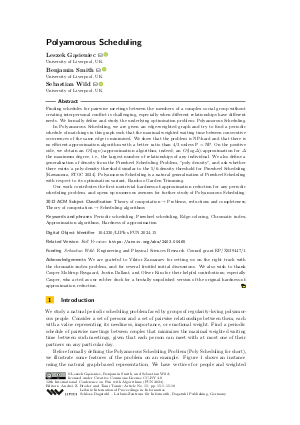@InProceedings{gasieniec_et_al:LIPIcs.FUN.2024.15,
author = {G\k{a}sieniec, Leszek and Smith, Benjamin and Wild, Sebastian},
title = {{Polyamorous Scheduling}},
booktitle = {12th International Conference on Fun with Algorithms (FUN 2024)},
pages = {15:1--15:18},
series = {Leibniz International Proceedings in Informatics (LIPIcs)},
ISBN = {978-3-95977-314-0},
ISSN = {1868-8969},
year = {2024},
volume = {291},
editor = {Broder, Andrei Z. and Tamir, Tami},
publisher = {Schloss Dagstuhl -- Leibniz-Zentrum f{\"u}r Informatik},
address = {Dagstuhl, Germany},
URL = {https://drops.dagstuhl.de/entities/document/10.4230/LIPIcs.FUN.2024.15},
URN = {urn:nbn:de:0030-drops-199234},
doi = {10.4230/LIPIcs.FUN.2024.15},
annote = {Keywords: Periodic scheduling, Pinwheel scheduling, Edge-coloring, Chromatic index, Approximation algorithms, Hardness of approximation}
}

 Creative Commons Attribution 4.0 International license
Creative Commons Attribution 4.0 International license




